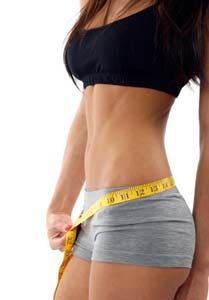 You have all been concerned about your tummies. Here we go.
You have all been concerned about your tummies. Here we go.
What do you think her diet is like?
Foods you need to avoid at all costs:- You need to avoid all fast foods,
- transfats (cheap cooking oils),
- white flour as much as possible,
- High Glycemic carbohydrates – simple carbs like sugar, processed fruit juicesetc
- Dairy is not essential in the diet. You would be better off not taking them often.
http://www.notmilk.com/kradjian.html - Anything that has a long shelf life.
- Wheat products if you are gluten sensitive – get a food allergy test to determine if you are
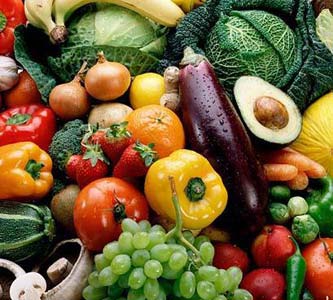 Foods you need to take frequently:
Foods you need to take frequently:
- Fresh green leafy vegetables – packed with nutrients, fiber and minerals.
- Lean animal proteins – beef, chicken breast, fish, shrimps, egg whites
- Protein substitute for vegetarians – tofu, whey protein, casein etc
- Complex carbohydrates –basmati rice, oats, potato, legumes and pulses.
- Healthy fats – nuts, fish oil, avocado, olive oil, peanut oil, flaxseed oil
- And some saturated fats. No, they won’t raise your cholesterol. Bad carbs raise your cholesterol. Read research.
http://www.ravnskov.nu/myth3.htm - Fresh fruits – berries have the lowest carbs and the highest antioxidants
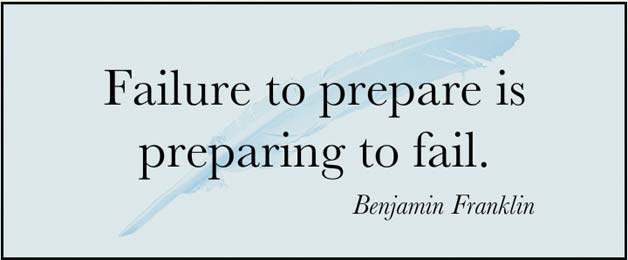 How to set up your meals.
How to set up your meals.
You basically need one food from each macro-nutrient category (protein, carb, fat) at each meal. The role of each of these macro nutrients is separate. If your blood sugar is low, even if you eat protein the protein has to be broken down and converted to glycogen in the body to bring up the blood sugars to baseline. Normal blood sugars are 70-110mg/100ml of blood. So the protein won’t get to its main task which is rebuilding tissues and restoring amino acid pools. In the same manner, fats help in recovery and hormone production etc, and carbs provide you with energy to mover around. When you diet for body composition (fat-loss) you don’t take snacks. You take complete meals. Clear? Let’s move on.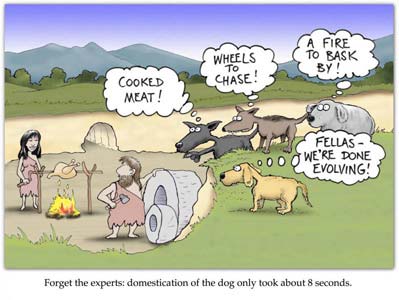 How many meals per day are ideal?
How many meals per day are ideal?
- This depends on convenience and activity. But normally we suggest a minimum of 5 meals per day. Eating every 2-4 hours is best. This might sound too much at first, but two of your meals can be a meal replacement shake – some fruits or dry oats (carbohydrate source), some whey protein isolate or casein (fast digesting protein source), and some natural peanut butter, nut or fish oil (fat source) can be a good meal replacement. If you take your normal breakfast, lunch and dinner you will have to take two more meals to complete 5. Very easy to do.
- The reason we take more frequent meals is to stabilize blood sugars. We want blood sugars to remain in the 70-110mg/100ml range. If your blood sugars fall too low you are going to crave a lot of bad stuff like cookies and chocolates and if your blood sugars go up too much you are going to release a lot of insulin (this hormone manages blood sugar – it will either push the glycogen into your muscles and liver if muscle and liver glycogen is low or it will push it into your fat cells if your muscles and livers are packed with glycogen and your blood sugars is above 110.)
- Another reason we take more frequent meals is to have a positive amino acid pool (amino acids come from complete protein sources). If your amino acid pools are low, and blood sugar is also low, your body is going to break down muscle tissue and organ tissues, turn them into glycogen and supply your vital organs like brain and heart with glycogen.
- We need to hold on as much muscle as possible while burning as much fat as possible. The more muscles you keep the more fat you are going to burn simply because now the engine (your body) is more active.
- When you take very infrequent meals, your body is on the storage mode. The signal to the body is “food is rare – I don’t know when I am going to get the next meal – so store.” This is your survival mechanism. Your body essentially wants you skinny-fat. Skinny because the less muscle you have less calories you will burn, and the more fat you have the longer you are going to live in case there is famine. Humans used to eat and get fat in summers and live on little food and on their fats through harsh winters. Every gram of fat will supply you with 9 calories. If you are carrying 25kg of fat you basically have 225000 calories in store. That’s enough to make you survive for quite a long time. The guys/girl with good lean genes have died in the harsh winters that’s why we see less of those genetic freaks who can literally be a garbage can, eat all day, and still stay lean. The skinny-fat genes have made it this far and if you are reading this you are one of those. Times have changed. We like to shed fat OFF in summers and normally pack it on in winters because we are covered.
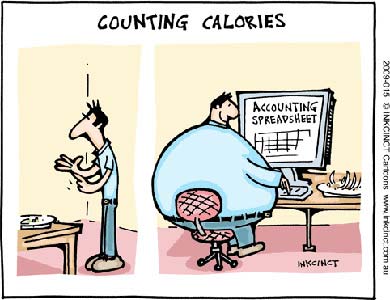 How many calories do I need per day? (BW: body weight in pounds)
How many calories do I need per day? (BW: body weight in pounds)
This gives a rough idea of how many calories you need per day based on your body weight in pounds.- Sedentary – weight-loss (BW X 10 -12), maintenance (BW X 12-14), weight gain (BW X 16-18)
- Active - weight-loss (BW X 12-14), maintenance (BW X 14-16), weight gain (BW X 18-20)
- Very active - weight-loss (BW X 14-16), weight maintenance (BW X 16-18), weight gain (BW X 20-22)
But you don’t need to really count calories. As your metabolism changes you are going to need less or more calories. This really depends on a lot of stuff. Also calories that you get from beer are very different from the ones you get from rice or potato. The calories you get from nuts is very different from the calories you get from fats in French fries. Its effect on your body and your hormones is drastically different.You need to be concerned about your health before you are concerned about your weight. Having a six pack doesn’t mean you are absolutely healthy. Counting calories hasn’t gotten anyone six packs either. It’s just much more than this.
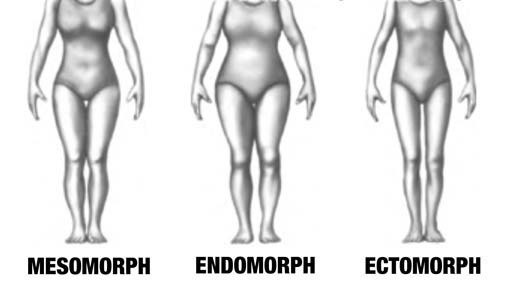 How much protein, carbs and fats do I need?
How much protein, carbs and fats do I need?
Depending on your somatotype (ectomorphic, mesomorphic, endomorphic) and physical activity you are going to break down your macro-nutrients as following:Protein 25-35%, Carbohydrates 55-25%, Fats 20-40%.
This really varies individual to individual and it would be wrong to tell you, without seeing you and knowing your body which percentage is the right percentage for you. Moreover, this changes as we diet, therefore we don’t give one time diet plans at Omnifarious. We start off, and then coach a diet and make the right adjustments at the right times. The way you lose the first 5kgs is going to be different when you are trying to lose the next 5kgs. That’s how the body works. Calories, proteins, carbs and fats all matter. Your somatotype and physical activities also vary a lot. The explanation of this topic is beyond what this handout is about.
But roughly speaking how much protein, carbs and fats do I need per meal?
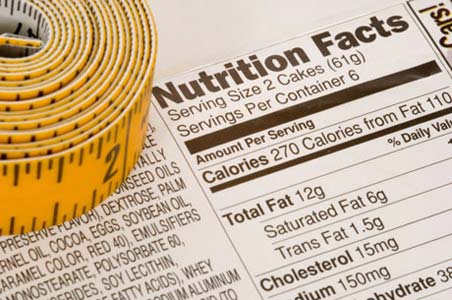 The values are per pound of lean body mass. You will have to take your body fat percentage and subtract it from your total weight to get the lean body mass (LBM) value.
The values are per pound of lean body mass. You will have to take your body fat percentage and subtract it from your total weight to get the lean body mass (LBM) value.Males: Protein (1-1.5grams/lbs LBM), Carbs (1-3grams/lbs LBM), Fats (0.1-0.3grams/lbs LBM)
Females: Protein (0.7-1grams/lbs LBM), Carbs (0.5-1grams/lbs LBM), Fats (0.1-0.3grams/lbs LBM)
For example: A 140lbs woman whose body fat is 30% will have about 100lbs lean body mass and we are going to base our values on that. Proteins normally remain the same – probably at higher end. Carbs will be low if the person is not active and higher the more active the person is. For fat loss the fats will be kept minimum.
Here we go:
100 x 0.7 = 70gram of protein
100 x 0.5 = 50grams of carbs
100 x 0.3 = 30grams of fats
This is the daily requirement of proteins, carbs, and fats. You need to divide them up by the number of meals you are going to take per day.
So if this 140lbs lady is taking 5 meals per day she is going to take 14grams of proteins, 10grams of carbs and 6 grams of fats PER MEAL. Now this is NOT the actual weight of food. Different protein, carb and fat sources have different values of protein, carbs and fats. For instance, 100gram of actual potato will have 20grams of carbohydrates. 100grams of chicken breast will have about 25grams of actual protein, and every 2 almonds will give you one gram of fat. You can visit www.nutritiondata.com and find out the protein, carb and fat contents of foods. For protein foods (fish, beef etc) we just count the proteins, for carb foods (rice, bread, potato, oats etc) we just count the carbs, and only fats for fat sources. We are not concerned how much fat chicken breast has, or how much carb there is in almonds.
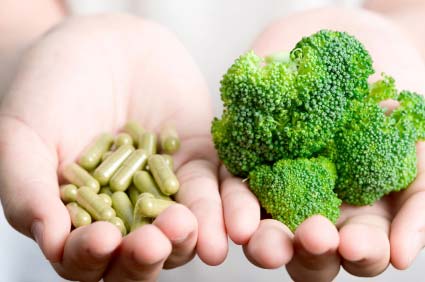
What supplement s do I suggest?
Fish oil is the only supplement that is essential. The rest you can get from foods. I normally suggest a multivitamin, a multi mineral per day. I am also a big fan of vitamin D supplementation. I get injections done every 6 weeks or so. You can also just orally take those injectable. There are a lot of supplements out there but you can’t just prescribe them cause they are supplements. What I can prescribe to all of you is this: “You need chicken breast, broccoli and a reason to live.” Normally a great diet won’t have you on a lot of supplements.The ones I mentioned are essential to health and a long life and 90 of people are deficient in them. So you are pretty safe taking them.Do we need cardio? How much?
As far as your fat-loss goals are concerned, if your diet is real good (properly designed and implemented with consistency), you probably don’t need any cardio at all. Women normally need to do cardio more than men because they are more resistant to lower body fat levels and also have less active tissue. The answer to this really varies according to individuals. But if you are going to do cardio you are going to have to do it right in the morning before meal one or right after exercise when your glycogen stores are depleted (or at least low). There is no point doing a lot of cardio when your blood sugars are through the roof. At least not when you are trying to lose fat.If you are training for marathon that’s fine.I explain energy systems and effectiveness of cardio in this article:How Effective ‘Walking’ is For Fat Loss?
The same thing is on this link if you had problem viewing that link:
http://www.moezaryan.com/index.php?option=com_content&view=article&id=228:how-effective-walking-is-for-fat-loss&catid=64:posts&Itemid=5
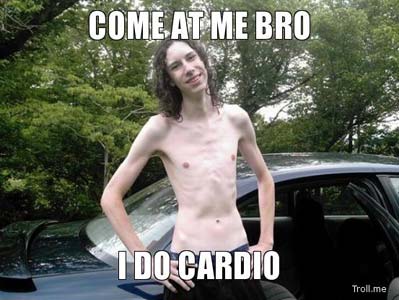 Starving yourself won’t take you too far:
Starving yourself won’t take you too far:
Starving yourself, cutting down on real food too much, counting calories, these won’t take you anywhere except ruining the quality of your body’s make up (muscle loss and resistance to fat loss and damaged metabolism) but also will affect other areas of your life including your relationship with people, your sexual relation, your job, physical activity, immune system weakness and the list continues. Read this classic example here: I have been working out for the past 6 months. I lost 6kgs initially but it's been 2 months now that I have not lost anything.
Importance of weight training:
- Weight training only makes you insulin sensitive therefore it makes you handle carbs better which means you are going to store less of it as fat. The culprit of obesity is excess carbs and no activity. And the carbs we consume are simple carbs. You don’t get “obese” on rice and potato. You might get fat but not obese. But with all those foods comes a soft drink, with every breakfast comes a processed fruit juice full of sugar or even worse high fructose corn syrup. When you do the math for calculating how much of carbs you need per day based on the formulas I gave you will be shocked at how excessive your carb intake is. Given your current diets you are in incredible shapes. Save your carbs for complex carbs like oats, quinoa, rice, potato, vegies and some fruits. But you have to stick to calculations. A carb intake for one person might make another person just fat. This is as individualistic as it gets.
- Women tend to avoid weight training. Not all but the ones who are still in the 80s Aerobic classes tend to get scared when you talk about weights. The ones who starve themselves to death to get lean also do get scared at the thought of even doing a lunge. Not true at all, most bone density diseases come to women after menopause. The best way to avoid losing muscle and bone density is heavy but smart weight training. Read this article. I have explained things in detail: Will Women Bulk Up If They Weight Train?
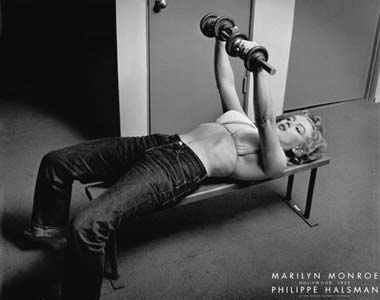
- Focusing only on problem areas. This problem is really old. Read this. I explain why doing a thousand crunches won’t help. If it did you would all have six-packs. Next time you ask me this question I am going to shoot myself. Just kidding J Six Smart Fat-Loss Questions
- Word to the men! I really don’t have much respect for men who are ‘afraid’ of weight training. Okay, that was a bit harsh. But where have gone the real men? One of you came to me the other day pointing at his tummy and said he wants to focus on the tummy and doesn’t want to get too big. Well, you should read this handout at least ten times. Fix your diet to see your six packs. Making muscle isn’t easy. Even if you do the best muscle building program on earth but if your diet is not that of a weight gainer diet you are not going to put on even a pound of muscle. It’s like trying to build a house with nothing. You need the raw material for it. And you need lots of it. Building one pound of pure muscle takes at least one month with proper dieting, proper training and proper chemical manipulation of your body. If you are natural and don’t use drugs you might put that much in 3 to 4 months. If you are a beginner you might put some more weight in the first few months but it won’t be a linear upward process. It’s going to take years. People go to gyms, eat tons of shit foods and put on 20lbs. They look big in the mirror. But that’s all fluff. Ten pounds is muscle, ten pounds is fat. When they diet down to see their six packs they won’t be left with more than 3 to 6 pounds of muscle. Why the hell put all that fat on in the first place? Plus, men’s natural Testosterone is anything between 300ng/dl to 1000ng/dl. You can go get a blood test done to see where you are at. Anyone with a testosterone level of 1000ng/dl or above will get a month of free training with me. I am that sure it’s not that high. The guys you see on stage with over 85 or 90kgs of pure dry muscle are on a zillion Anabolic steroids and their Testosterone is supplemented to be over 5000 or 6000ng/dl FOR YEARS at a stretch. They haven’t missed a training session for quite some time, they train at least 5 times per week, their diets are absolutely based on science and calculated and they train REALLY heavy with high high, I am going to say it again, high volumes – lots of reps, lots of sets to failure per body part. Even then this style of training won’t make you bulky. Even if you did become “bulky” and didn’t like it, just do some cardio every day, stay away from carbs for some time and you will lose all of it in one tenth of the time you gained it. Probably even in a shorter time.
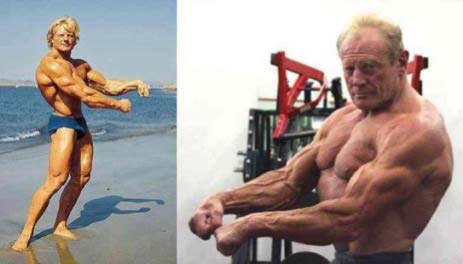
This is just an outline of dieting for fat-loss. Things vary as you move on and protein/carb/fat ratios will have to change at the right points. Going from obese to fat is easy. Going from fat to lean is easy for some and little challenging for others. But getting ripped and keeping a six pack year round is a lot of hard work and a lot of nutrition science, at least for the ones who don’t have the greatest genetic. If you are reading this, chances are you are not one of those.
Hope this handout helps you understand where the fat has come from and what are the most sustainable ways of dealing with it and keeping it away while feeling good, performing good, improving health markers, and also changing your body composition. Problems cannot be solved by the same mind which created them. You need to learn a new thing to bring about a new thing.
For now, your job is to stop taking those breakfasts that are ruining your body and causing spikes in blood sugars and crashes throughout the day. Start making small changes every day. Start having meals that not only support fat-loss but health. Take baby stepsand you are only going to get better.
Some of you will get it, some of you won’t and some of you won’t want to.
Life is the result of our priorities...
Feel free to ask me your questions when you see me or send me an email to info@moezaryan.com or moez@omnifarious.net.pk
Thanks,
Moez Aryan
Nutritionist & Trainer
blog comments powered by Disqus
